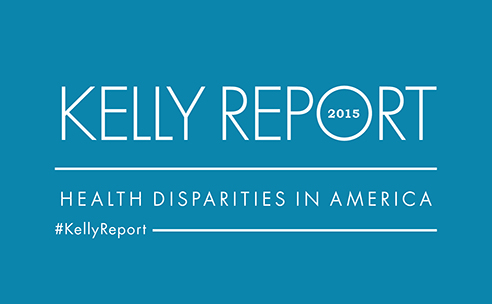Lupus Highlighted in New Congressional Report on Health Disparities

A new Congressional report includes an article contributed by the Lupus Foundation of America (Foundation) on health disparities among people with lupus and current efforts to improve treatment and diagnosis in minority communities. Foundation President and CEO Sandra C. Raymond joined U.S. Representative Robin Kelly (D-IL), Chair of the Congressional Black Caucus (CBC) Health Braintrust at an event today to release the report at the CBC Foundation’s Annual Legislative Conference.
Ninety percent of all people affected by lupus are women and African Americans are three to four times more likely to develop lupus. The report, 2015 Kelly Report on Health Disparities in America (PDF), released by the CBC Health Braintrust—one of Congress’s principal health care advisory task forces—examines the root causes and impact of health disparities in America, and brings together members of Congress, academia and health reform advocates to provide a comprehensive set of legislative and policy recommendations to improve health outcomes in communities of color.
“Lupus among racial and ethnic minority groups is a dramatic and significant public health problem that cries out for national attention and resources,” wrote Raymond in the report. “Without adequate and robust funding for biomedical research, progress into discovering, developing, and delivering new medications to people with lupus will continue to be delayed. The result will have a devastating impact on all people with lupus, especially members of the African American community who are at greatest risk for the disease.”
"I thank Sandra Raymond and the Lupus Foundation of America for their contribution to the 2015 Kelly Report,” said Congresswoman Kelly. “Now is the time to address this disease, which disproportionately impacts young African American women. The fact is that as many as 1 in 250 black women will get this disease. Black women have the highest rate of developing lupus and are most likely to be diagnosed at a younger age than whites during childbearing years. As we continue the conversation about reducing health disparities and achieving health equity in a generation, curing lupus must be at the forefront in the discussion."
The Foundation is currently working with the Centers for Disease Control and Prevention and the National Association of Chronic Disease Directors, to develop the first-ever National Public Health Agenda for Lupus. The Agenda, to be released this fall, specifically addresses health disparities and will provide a broad public health approach to lupus diagnosis, disease management, treatment and research, and serves as an overall blueprint for action in lupus to help guide future policy, planning, advocacy, and action initiatives.
“The significance of lupus in the African American community can no longer be ignored, and it is clear there is much work to do to improve health equity among those who suffer from the disease,” said Raymond. “We must ensure patients and physicians are educated about lupus to help reduce the time to disease diagnosis, that patients are starting the correct treatments faster in order to limit organ damage and that patients are connected with valuable and culturally appropriate supports and services to help manage living with this cruel and mysterious disease.”



